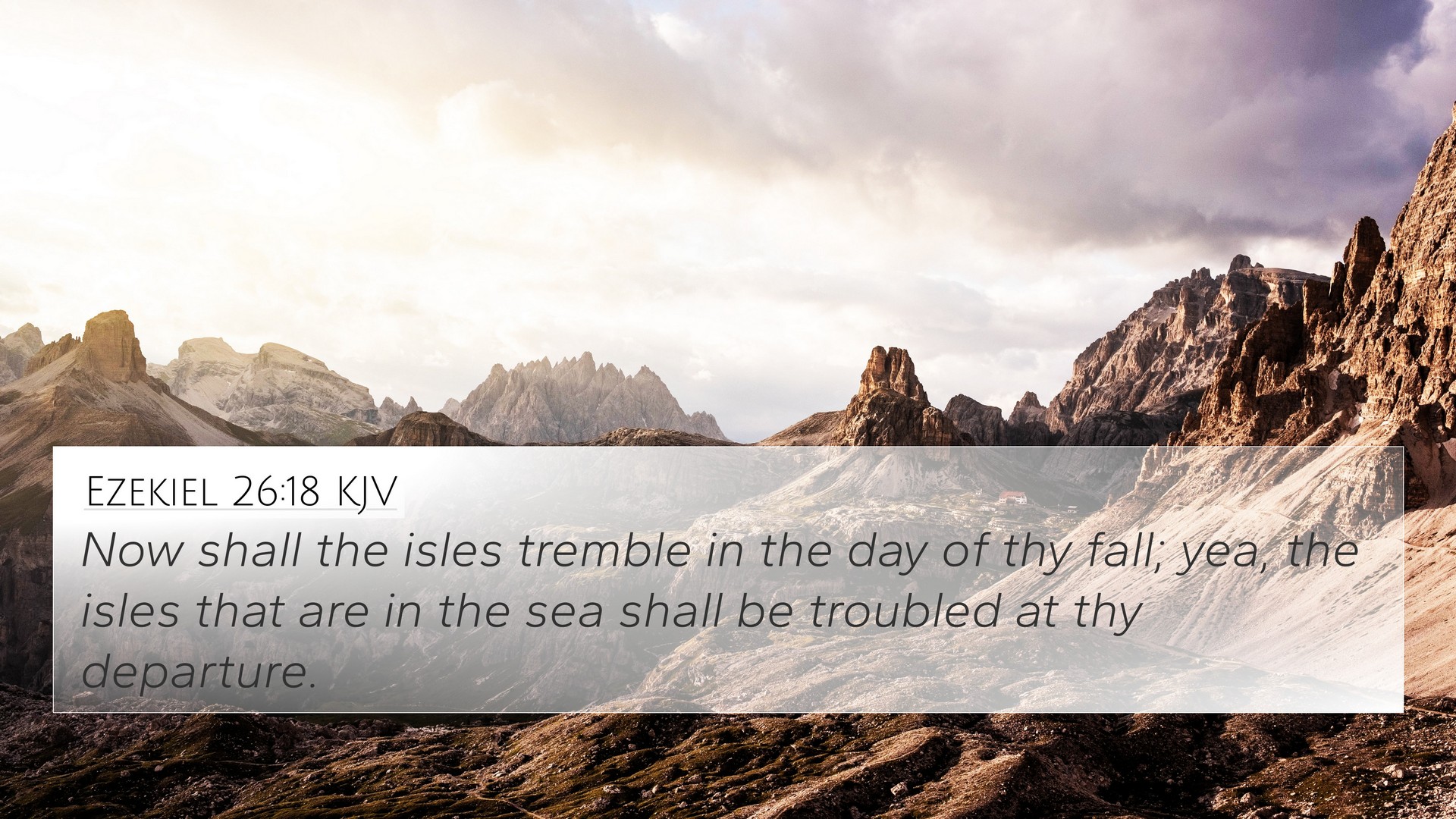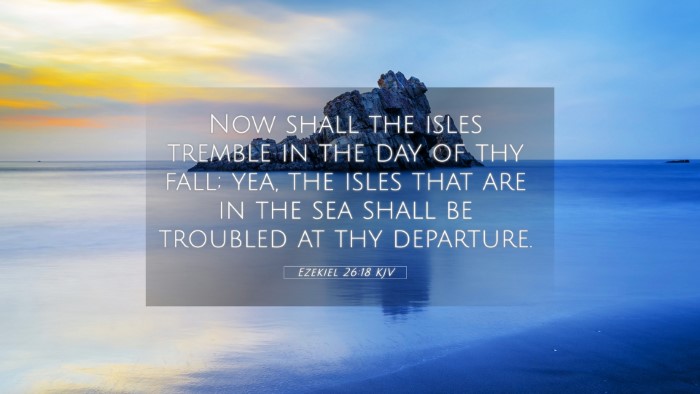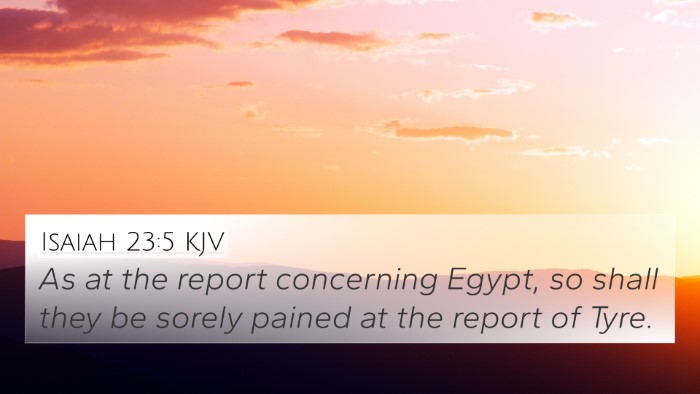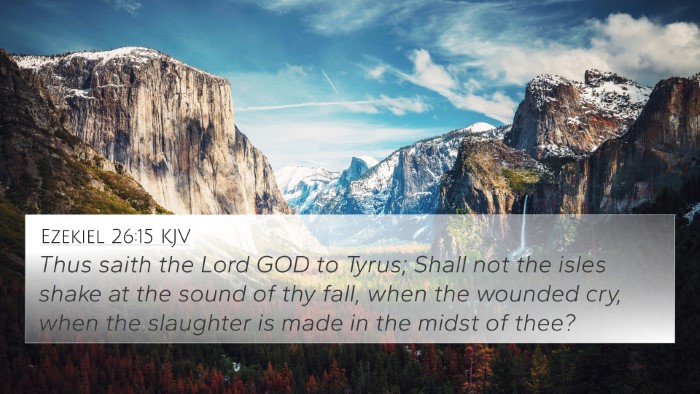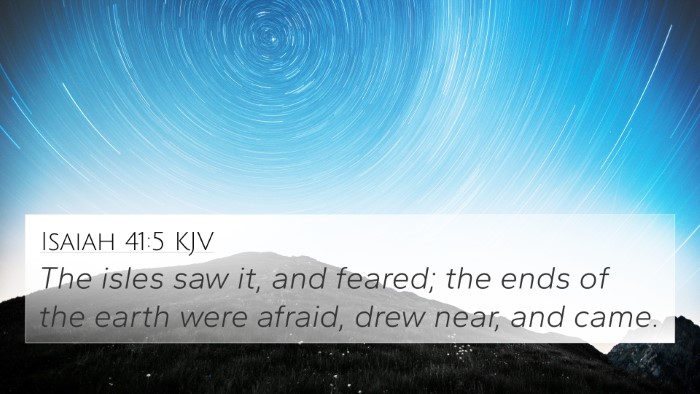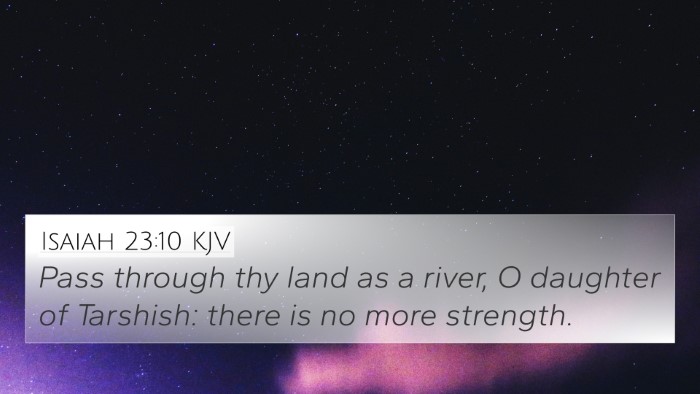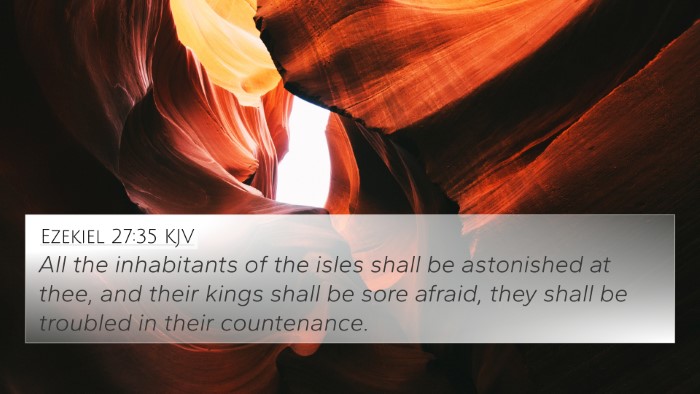Ezekiel 26:18 - Meaning and Interpretation
Ezekiel 26:18 states, "Now the coastlands tremble on the day of your fall; the islands in the sea are terrified at your collapse." This verse reflects the impending judgment upon the city of Tyre, showing how its destruction will not only affect its immediate vicinity but will also send ripples across the surrounding territories.
Contextual Overview
In the broader context of Ezekiel's prophecies, this verse is part of a series of judgments against foreign nations. Tyre’s pride and arrogance led it to believe it was invincible, best evidenced by its fortified structure and wealth. Ezekiel prophesies that its fall will serve as a warning to other nations, highlighting the theme of God’s sovereignty over all nations and His authority to judge.
Commentary Insights
Matthew Henry's Commentary
Matthew Henry emphasizes the idea of fear and desolation that will result from Tyre’s destruction. He points out how neighboring regions will be struck by terror, acknowledging that no place is immune to divine judgment. Henry also draws connections between Tyre’s fate and the fate that awaits all kingdoms that reject God, asserting that divine retribution is inevitable.
Albert Barnes' Notes on the Bible
Albert Barnes highlights that this verse illustrates the universal impact of Tyre's downfall, portraying it as a metaphor for all nations that support oppression and pride. He notes the terrified reaction of the coastal regions, symbolizing how influential powers will fall and unsettle those who relied on their strength. Barnes points out that Tyre, although wealthy and powerful, cannot escape the justice of God.
Adam Clarke's Commentary
Adam Clarke provides an in-depth analysis of the psychological effects of Tyre's fall, elaborating on how fear permeates the surrounding territories. He articulates that even lands far removed from the physical destruction will feel the shockwaves of such an event. Clarke reinforces the message of accountability before God, drawing parallels to other nations that faced similar consequences throughout Biblical history.
Thematic Connections
The verse serves as a pivotal point in understanding the themes of judgment, fear, and the sovereignty of God. Through various public domain commentaries, we discern a common thread: the inevitability of God's justice and the way it promotes an awareness of His authority across nations.
Bible Verse Cross-References
- Ezekiel 28:17: Illustrates the pride preceding destruction.
- Isaiah 23:1: A foretelling of Tyre's fall and its impact on trade.
- Jeremiah 25:22: Addresses the nations that will face judgment.
- Amos 1:9: Typifies the fate of Phoenician cities due to their sins.
- Revelation 18:17-19: Applies the similar theme of judgment upon cities of trade.
- Lamentations 2:15: Reflects on the shock of neighboring people at the destruction of Jerusalem.
- Habakkuk 2:14: Speaks to God’s eventual glory filling the earth as a response to human actions.
Bible Cross-Referencing and Thematic Analysis
Understanding the connections between Bible verses can deepen one’s comprehension of theological themes and historical narratives. This approach, known as bible cross-referencing, unlocks intricate insights into God's character and His interaction with humanity.
Tools for Bible Cross-Referencing
- Utilizing a bible concordance helps to locate terms and themes systematically.
- Employing a bible cross-reference guide can enhance one's understanding of interrelated scriptures.
- Incorporating bible reference resources, including commentaries, broadens the interpretation landscape.
Application in Study Methods
Cross-referencing Bible study methods enable a richer engagement with the text. For effective results:
- Identify common themes and cross-references within the Old and New Testament.
- Focus on detailed cross-references between the Gospels, especially when discussing themes of judgment and redemption.
- Link the Prophets and Apostolic teachings to ascertain continuity in God's message.
- Explore bible cross-references for sermon preparation to develop robust theological arguments.
Conclusion
The verse in Ezekiel illustrates not only God's plan for Tyre, but also serves as a sobering reminder of divine judgment's far-reaching consequences. The interconnectedness of Scripture invites the faithful to explore, understand, and internalize the lessons woven throughout the biblical narrative.
